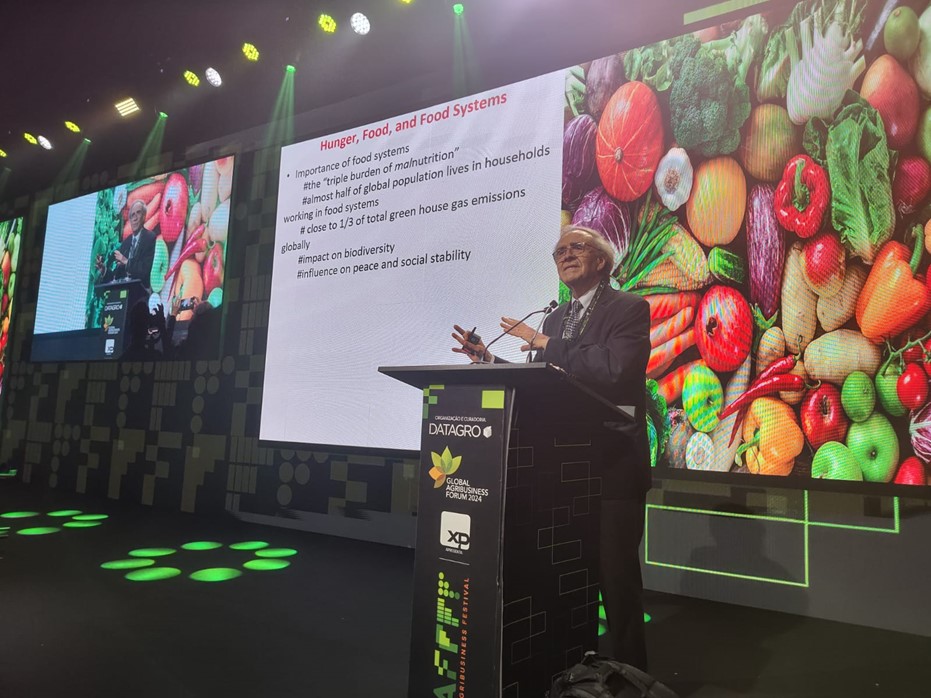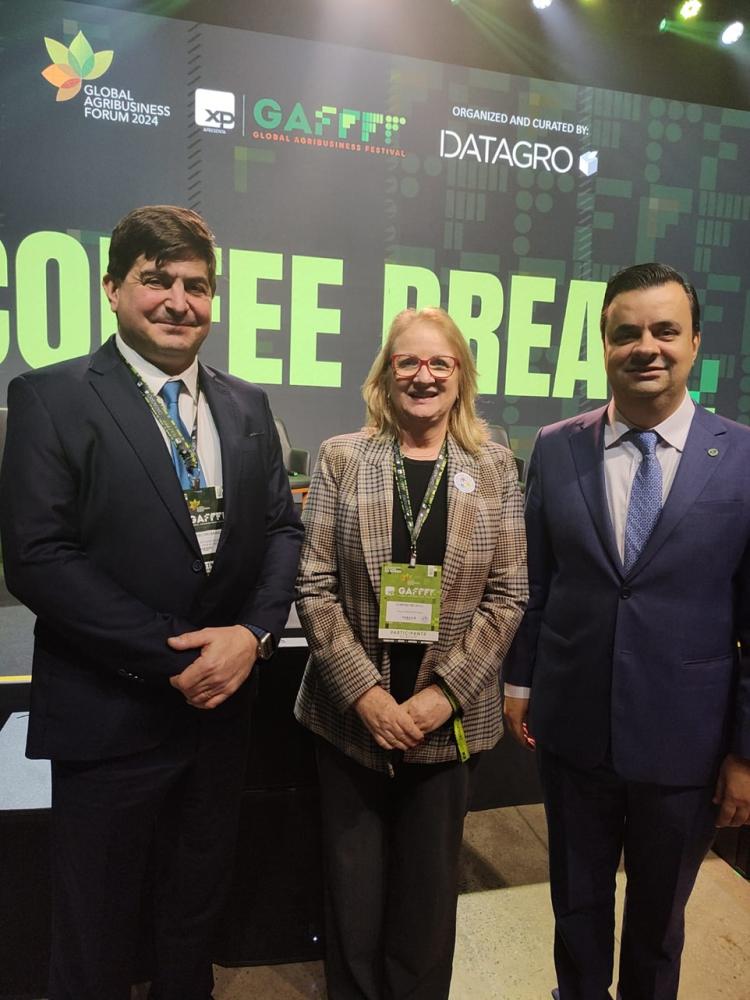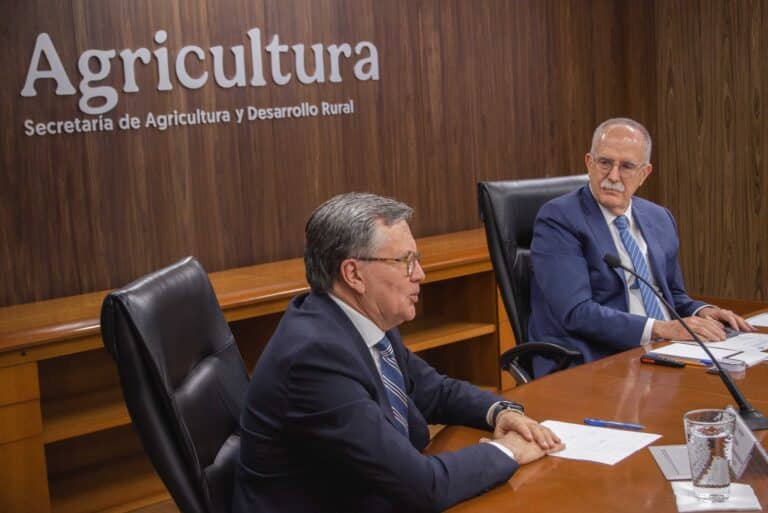The study was presented at the Global Agribusiness Forum (GAF), part of the Global Agribusiness Festival in São Paulo, the world’s largest agribusiness event organized by Datagro, which brought together around 12,000 people from the sector, including public managers and politicians.

São Paulo, 3 July 2024 (IICA) – Amidst the challenges posed by food, energy, and climate crises, the transformation of food systems is becoming increasingly urgent. But how can we change an intricate and complex system that includes crops, ends with the consumer, and involves processing, transportation, distribution, and consumption, all of this with economic, social, cultural, and health implications for both animals and humans?
To reduce resistance to necessary changes and foster greater commitment from various sectors and stakeholders involved in this challenge, the Inter-American Institute for Cooperation on Agriculture (IICA) proposes an approach in its document “On ‘Broken’ Food Systems and Other Narratives.” This approach considers not only the costs but also the benefits of the current functioning of these systems and suggests changing the narrative from “broken systems” to one that considers “the true value of food.”
In general terms, this means shifting the argument that claims that the hidden costs of the current functioning of the systems -related to health, poverty, and the environment – exceed the monetary value of food, to a narrative of the “true value of food,” carefully clarifying the nature of the so-called hidden costs to determine whether they are consequences of failures in food systems or markets, financial issues, justice and inequality problems, or other consequences unrelated to food systems.
The study was presented at the Global Agribusiness Forum (GAF), part of the Global Agribusiness Festival in São Paulo, the world’s largest agribusiness event organized by Datagro, which brought together around 12,000 people from the sector, including public managers and politicians. Gabriel Delgado, coordinator for the Southern region and IICA representative in Brazil, participated as a speaker on the panel on Sustainability in Agriculture. Economist and IICA consultant Eugenio Díaz-Bonilla, one of the authors of the study, presented the work.
The document analyzes the global performance of food systems and their efficiency in feeding people, listing various problems at different stages. The authors address the negative effects of food systems on the environment -such as greenhouse gas emissions, deforestation, soil degradation, and biodiversity loss- and insist on the need for more sustainable agricultural practices. It also addresses changes already adopted in systems and consumption patterns driven by economic, technological, and social factors. The document emphasizes the importance of adapting these systems to the nutritional and health needs of the population.
According to the publication, improving agri-food systems requires a comprehensive understanding of their functioning and the design of public policies based on a detailed cost-benefit analysis. The authors highlight the importance of international cooperation and the participation of all stakeholders in the sustainable improvement of systems and the adoption of public policies based on scientific evidence.
Food systems have become a significant focus of global efforts to achieve the Sustainable Development Goals (SDGs) of the 2030 Agenda. For this reason, the United Nations convened the Food Systems Summit in 2021 to analyze how food systems operate worldwide and begin designing change and adaptation strategies. On this occasion, IICA prepared a document with key messages from the Ministers of Agriculture and Livestock of the Americas.
For IICA, agricultural producers must be properly represented in discussions on change and adaptation, decisions and policies must be based on science, and agriculture must be seen as part of the solution to the existing challenges.
“It is important to understand the systems, incentives, and structural factors in depth in order to design regulations that help food systems produce enough diverse, safe, and nutritious food for everyone, while ensuring social, economic, and environmental sustainability,” said Eugenio Díaz-Bonilla. “Transforming food systems is a major challenge, but we are confident that this can be achieved. And for this, international cooperation is crucial and urgent,” affirmed Gabriel Delgado.
IICA Communication Committee

Simultaneously, the document was presented to members of IICA’s Advisory Committee on Communication at a virtual event attended by Fernando Mattos, Uruguay’s Minister of Livestock, Agriculture, and Fisheries; Manuel Otero, IICA Director General; and two of the document’s co-authors, Eugenio Díaz-Bonilla and Rosario Campos.
In the presentation, it was concluded that the agricultural sector of the Americas must deepen its integration and search for consensus to consistently and continuously present unified positions in international forums. The participants also highlighted the indispensable role of agriculture as a guarantor of food security and as part of the solution to the climate crisis.
The Committee comprises opinion leaders with a history of significant contributions to the agri-food sector and experts in public and institutional communication. It was launched by IICA in 2020 to positively influence public recognition of agri-food chains, and was initially composed of ten members from seven countries. More recently, it was expanded to include private sector participation and now has over 20 members representing a wide variety of countries and roles in communication.
“Under the leadership of Manuel Otero, IICA has implemented communication strategies to counteract narratives that are not based on science, and which claim that agriculture is causing climate change. But we still need greater efforts from the countries of the Americas, to act as a bloc in those international forums where agriculture is considered the culprit of these problems,” said Mattos, who also chairs the Inter-American Board of Agriculture (IABA), the highest governing body of IICA comprising the 34 Member States.
“Our region’s countries have fought in isolation for more than 60 years against protectionism, which has been a barrier to international food trade. Now, we must have a unified stance on the European Union’s Deforestation Regulation because, although it is a sovereign measure, it has a high degree of hypocrisy, as Europeans are major greenhouse gas emitters and are transferring the mitigation responsibility to the rest of the world,” added Mattos.
The Uruguayan minister emphasized the enormous value of the document presented during the meeting and considered that “food systems are hardly broken. We have the enormous challenge of showing the efforts our continent is making in sustainable production. The Americas are the backbone of food security for nearly 8 billion people worldwide.”
“At international forums, we are acting in accordance with the mandate of the Ministers of Agriculture of the Americas, in an attempt to convey our truth regarding the position of food systems and the role they must play for the future of humanity,” affirmed Otero.
IICA’s Director General highlighted the work being done by IICA through its participation in the G20 Agriculture Working Group, which brings together the world’s largest economies, and in preparation to convey the message of the continent’s agricultural sector at the upcoming United Nations Climate Change Conferences (COP 29 and 30).
“Global environmental discussions cannot leave agriculture aside. Agriculture is a key sector and is part of the solution,” emphasized Otero.
Díaz-Bonilla and Campos explained that the region is a pioneer in sustainable practices such as silvopastoral systems and no-till farming, and noted that the continent’s agriculture has recently increased its productivity thanks to science and innovation without using more land.
“Food systems are not broken because they do not subtract value. Although productive, economic, social, and environmental aspects need improvement, food systems must be strengthened, especially in the Americas, which is the guarantor of global food security.”
More information:
Institutional Communication Division.
comunicacion.institucional@iica.int











